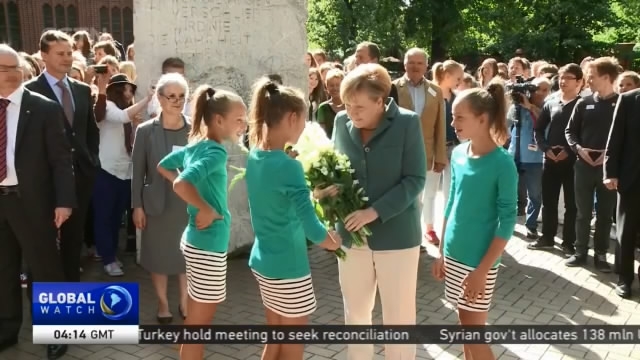
13:04, 07-Jan-2018
Germany Politics: Merkel to hold exploratory talks with SPD on Grand Coalition

Now to Germany. More than three months after federal elections, Chancellor Angela Merkel is still scrambling to form a new government. The Social Democrats are still her best bet. The two sides will hold exploratory talks on forming a new Grand Coalition. Yang Zhao has more.
Time is tight for Angela Merkel, and her Christian Democrats.
After three-months and failure, Merkel is cornered. She's launched five-day exploratory talks with the SPD.
The leader of the Christian Social Democrats, the Bavarian sister party to Merkel's CDU, said he was"very confident" that coalition talks with the rival SPD would be successful.
HORST SEEHOFER CSU LEADER AND BAVARIAN STATE PREMIER "I think we'll manage it. I am very confident. What we need now is discipline, courage and a measure of creativity. Then we will be successful."
He also admits the SPD is the last option for a stable government after efforts with two smaller parties failed. He said the responsibility to the country would unite them.
HORST SEEHOFER CSU LEADER AND BAVARIAN STATE PREMIER "We are united by the fact that we have a responsibility to the country, that after the failure of Jamaica, the last option for a stable government is a Grand Coalition. This task unites us."
But the SPD has been playing hard-to-get. The two parties have bickered over a range of issues, notably immigration and taxation.
Germany's Bavarian conservatives are pressing for corporate tax cuts and cuts to welfare payments for asylum seekers. There was a prolonged conflict over Merkel's decision in 2015 to welcome more than one million migrants to Germany.
Meanwhile the SPD has called for increasing taxes on the wealthy. The party is pressing for more spending on infrastructure, education, health care and other social priorities.
Those areas could complicate talks with the Social Democrats on forming a new government.
Pressure is mounting on Merkel to form a new government three months after the election.
If the discussions fail, Europe's largest economy could either face fresh elections or, for the first time in the postwar era, a minority government under Merkel. If the talks prove successful, a new government will likely be in place by Easter.

SITEMAP
Copyright © 2018 CGTN. Beijing ICP prepared NO.16065310-3
Copyright © 2018 CGTN. Beijing ICP prepared NO.16065310-3